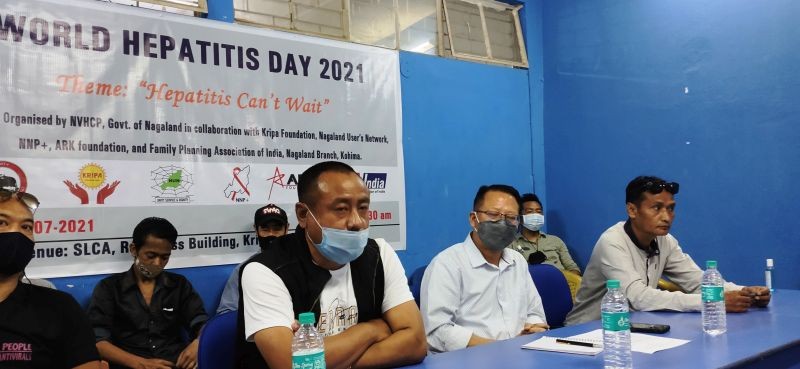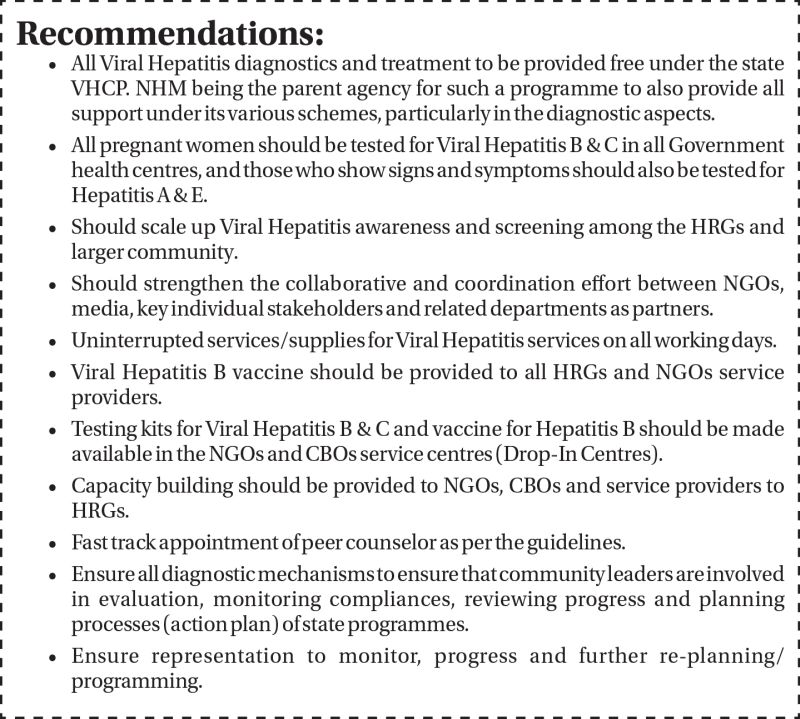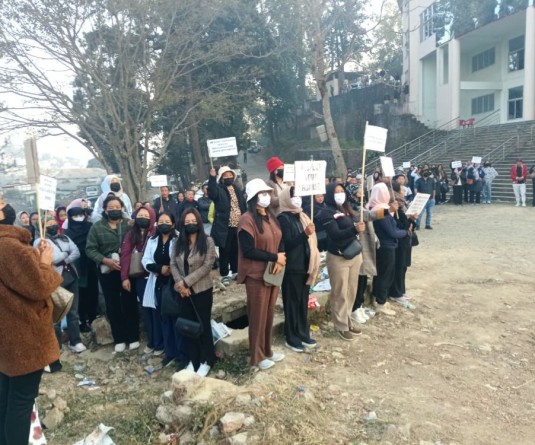The World Hepatitis Day 2021 was observed with the theme ‘Hepatitis Can’t Wait’ in Kohima on July 28. (Morung Photo)

Morung Express News
Kohima | July 28
With no surveillance system in place or independent studies available in the Nagaland, the prevalence and burden of Hepatitis C (HCV) disease remains unknown, and continues to remain neglected in the absence of any government initiated programmes, treatment and diagnostic of Viral Hepatitis.
Against the backdrop of World Hepatitis Day observed with the theme ‘Hepatitis Can’t Wait’ on Wednesday, key stakeholders have iterated that the graveness of the situation is not documented and nothing substantial has been done by the State Government to provide prevention and treatment programme or to improve services relating to HCV.
Although HCV poses a ‘silent major threat’ to public health which is said to be silently taking away precious lives, particularly the high risk group of population, unfortunately there is little or no awareness programmes on this killer disease.
Sharing his experience, a recovering substance user, Kato Kiba said, “I did not know I was a silent carrier of HCV and did not know when or how I got infected.” According Kiba, he went for HCV testing on the behest of a friend in 2020 and came to know he was infected with the disease.
Except for HIV test, Kiba said he never thought of testing himself for HCV and shared the high cost of diagnostic tests at private clinics which, he pointed is a huge burden on people like him, who already have financially drained everything on their substance addiction.
“Many of those infected with Hepatitis C will be unaware, and therefore, may go undiagnosed and untreated, posing a risk of further transmission. HCV poses a major threat to public health, economic and social crises. Therefore, IEC needs to be strengthened in creating awareness across the state,” said Abou Mere, Director, Kripa Foundation speaking on the occasion.
Also in the absence of any data or studies available, Mere informed that Kripa Foundation and ICMR collected 98 blood samples of current and ex-drug users for HBV, HCV and HIV from Kripa Foundation Rehab and Drop-In Centre wherein the report indicated 30.61% to be HCV reactive (screening/serologic test only).
Further, he informed that the Integrated Bio Behavioural Assessment (IBBA) study among injecting drug users from Phek and Wokha districts showed prevalence rates of 8.7% and 20.8% respectively.
While the National Health Mission (NHM) free diagnostic scheme provides 57 tests and diagnostics, Mere questioned as to why People Living with Viral Hepatitis B&C should bear the cost of the diagnostics at the Model Treatment Centre (Naga Hospital Authority Kohima) and Districts Treatment Centres (Districts Hospitals).
“When NHM GoI provides a free diagnostic scheme providing 57 testing and diagnostics, why does the general public need to pay for diagnostics? If Nagaland is not availing the free diagnostic scheme why our state is not availing the said scheme?” he further questioned.
Towards this end, he asserted, “No one should die with a treatable and curable disease or get an infection, which is preventable.”
Describing HCV as a ‘public health burden,’ State Nodal Officer, NVHCP Nagaland, Dr Joel who was the guest speaker informed that 1.5 million die every year due to HCV, indicating one death in every 30 seconds.
Presenting a figure of HCV where screening has been done in some pockets in the State, Dr Joel said out of 27,700 people screened for Hepatitis B 0.9% were found infected while 0.69% were found to be infected with Hepatitis C out of 27500 people screened and 0.7% among pregnant women.
Highlighting on NVHCP, he said it is an integrated initiative for the prevention, control and end viral hepatitis in India by 2030. The focal intention of this programme, he informed, is to achieve reduction in infection, morbidity and mortality associated with Hepatitis B and C, and also reduce the risk, morbidity and mortality due to Hepatitis A and E.
While conceding that the state could not implement the NHM free diagnostic scheme due to ‘technical problem’, he also assured to look into this matter. He also called for collaborative efforts from NGOs and CBOs adding, “If left alone to the government, we will not be able to achieve the 2030 goal.”
Today’s programme was jointly organised by National Viral Hepatitis Control Programme government of Nagaland with Kripa Foundation, Nagaland User’s Network, NNP+, ARK Foundation and Family Planning Association of India, Nagaland Branch, Kohima at SLCA, Red Cross Building, Kripa Foundation Kohima.
Following the discussion, participants present at the programme also proposed several recommendations. (See Box)







